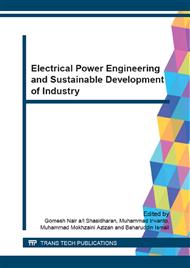p.378
p.383
p.388
p.393
p.398
p.403
p.407
p.412
p.417
Comparative Efficiency of Solar Panel by Utilize DC Water Pump and DC Hybrid Cooling System
Abstract:
The purpose of this paper is discussed about comparative efficiency of solar panel by utilize DC water pump and DC hybrid cooling system. Ambient temperature and solar irradiance are played main role of the efficiency of PV module. When temperature of PV module increase, the efficiency of PV module will decreased and vice versa. When solar irradiance increase, output current and output power will increase with linear and output voltage will increase with marginal and vice versa. A solution is provided to solve problem of low efficiency of PV module which is DC cooling system. DC brushless fan and water pump with inlet/outlet manifold were designed for actively cool the PV module to improve efficiency of PV cells. The PV module with DC water pump cooling system increase 3.52 %, 36.27 %, 38.98 % in term of output voltage, output current, and output power respectively. It decrease 6.36 °C compare than to PV module without DC water pump cooling system. While PV module with DC hybrid cooling system increase 4.99 %, 39.90 %, 42.65 % in term of output voltage, output current, and output power respectively. It decrease 6.79 °C compare to PV module without DC water pump cooling system. The higher efficiency of PV module, the payback period of the system can be shorted and the lifespan of PV module can be longer.
Info:
Periodical:
Pages:
398-402
DOI:
Citation:
Online since:
September 2015
Authors:
Keywords:
Price:
Сopyright:
© 2015 Trans Tech Publications Ltd. All Rights Reserved
Share:
Citation:


